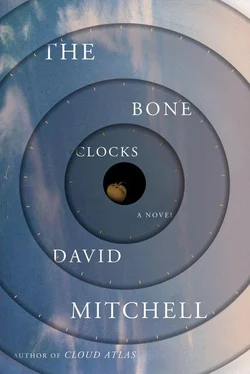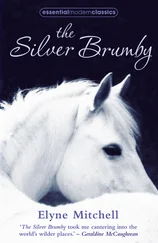“She was, yes,” says Holly. “That’s grand, thanks.”
Sadaqat places a matching willow-pattern teapot and teacup, a jug of milk, and a bowl of sugar on a mat. My green tea is brewing in a black iron teapot owned by Choudary Marinus, two selves ago. Arkady drinks coffee from a bowl. Sadaqat puts a lit candle in a stained-glass cup as a centerpiece. “To brighten the place up. It can get a little tomblike in here.”
In a parallel universe the man’s a design fascist , subsays Arkady.
“Just what we need, Sadaqat,” I say. He leaves, pleased.
Holly folds her arms. “You’d better begin. I’m too …”
“We’ve invited you here this morning,” I say, “to learn about us and our cosmology. About Atemporals and psychosoterics.”
This sounds like a business seminar, Marinus , subsays Arkady.
“Hold on,” says Holly. “You lost me at ‘Atemporals.’ ”
“Prick us, we bleed,” says Arkady, cupping his coffee bowl, “tickle us, we laugh, poison us, we die, but after we die, we come back. Marinus here has gone through this — thirty-nine lives, is it?”
“Forty, if we include poor Heidi Cross at her bungalow by the Isle of Sheppey.” I notice Holly watching me for signs of a second head or a maniacal cackle.
“I’m still a newbie,” says Arkady, “on my fifth self. Dying still really freaks me out, in the Dusk, looking over the Dunes …”
“What dusk?” asks Holly. “What dunes?”
“ The Dusk,” Arkady says, “between life and death. We see it from the High Ridge. It’s a beautiful, fearsome sight. All the souls, the pale lights, crossing over, blown by the Seaward Wind to the Last Sea. Which, of course, isn’t really a sea at all, but—”
“Wait wait wait.” Holly leans forwards. “You’re saying you’ve died? That you’ve seen all this yourselves?”
Arkady drinks from his coffee bowl, then wipes his lips. “Yes, Ms. Sykes, to both your questions. But the Landward Wind blows our souls back, like it or not. Back over the High Ridge, back into the Light of Day, and then we hear a noise like … a town being dropped, and everything in it smashing to bits.” Arkady asks me, “Fair description?”
“It’ll do. Then we wake up in a new body, a child’s, usually in need of urgent repair, just vacated by its previous owner.”
“At the café,” Holly turns to me, “you said that Hugo Lamb’s lot, the Anchorites, are immortal ‘with terms and conditions.’ Are you and they the same?”
“No. We live in this spiral of resurrections involuntarily. We don’t know how, or why us. We never sought it. Our first selves died in one of the usual ways, we saw the Dusk as Arkady just described, then forty-nine days later we came back.”
“From then on,” Arkady unthreads and rethreads his ponytail, “we’re stuck on repeat. Our second body grew, matured, died; bam , we’re back in the Dusk; then, whoosh , forty-nine days later, we’re waking up back on earth — in a body of the opposite gender, just to well and truly screw your head up.”
Swearing won’t make you more credible , I subreprimand him. “What matters,” I tell Holly, “is that no one pays for our atemporality. Its cost we alone pay. Our phylum, if you will, is herbivorous.”
From the street below we hear the screech of brakes.
“So,” asks Holly, “the Anchorites are all carnivores?”
“Every last one.” Arkady runs his finger round his bowl.
Holly rubs her temples. “Are we talking … vampires?”
Arkady groans. “Oh, the V-word! Here it comes again.”
“Carnivores are only metaphorically vampiric,” I tell Holly. “They look as normal, or as abnormal, as any other subset of the population — plumbers, bankers, diabetics. More’s the pity they don’t all look like David Lynch villains. Our work would be easier by far.” I breathe in the bitter green-tea steam and anticipate Holly’s next question. “They feed on souls, Ms. Sykes. Carnivores decant souls, which means abducting people, ideally children,” I hold her freshly unsettled gaze as she thinks about Jacko, “which means killing them, I’m afraid.”
“Which is not nice,” says Arkady. “So Marinus, me, and a few other unthanked individuals — Atemporals for the most part, with some mortal collaborators — make it our business to … take them down. Individual Carnivores rarely give us that much bother — they tend to think they’re the only ones, and operate as carelessly as shoplifters who refuse to believe in store detectives. The problems begin — our War started — when they hunt in a pack.”
“Which is why we’re here, Ms. Sykes,” I sip my tea, “because of one particular pack. ‘The Anchorites of the Chapel of the Dusk of the Blind Cathar of the Thomasite Order of Sidelhorn Pass.”
“Too long for business cards.” Arkady interlaces his fingers, inverts his hands, and lifts his arms. “Just ‘Anchorites,’ to friends.”
“The Sidelhorn’s a mountain,” says Holly. “In Switzerland.”
“Quite a climb it is, too,” I remark. “Sidelhorn also lends its name to a pass in northern Italy, a road that was old even when Roman legions used it. A Thomasite monastery served as a hostelry on the pass, on the Swiss Valais side, from the ninth century to the last year of the eighteenth. There, in the 1210s, a figure known as the Blind Cathar ontologized into being a conduit into the Dusk.”
Holly scans this blast of history. “The Dusk that lies between …”
“Life and death,” says Arkady. “Good, you’re listening.”
Holly asks, “What’s a Cathar?”
“The Cathars were twelfth- and thirteenth-century heretics,” I say, “in Languedoc. They preached that the world was created not by God but the devil, that matter was evil, that Jesus, as a man, was therefore not the Son of God. The papacy did not approve. In 1198 Pope Innocent III proposed a landgrab that became known as the Albigensian Crusade. The King of France was otherwise engaged, but he gave barons from the north of France his blessing to ride south, kill Cathars, confiscate their lands, and subdue a disloyal region for the French Crown. Heresy is fissiparous, however. What was smashed, splintered. Our Blind Cathar had settled at a Thomasite monastery in distant Valais by, we guess, 1205, 1206. Why he chose the Sidelhorn, we do not know. His name, we do not know. His impetuses for delving into matter, noumena, logos, mind, the soul, the Dusk, we do not know. He appears in only one historical source. Mecthild of Magdeburg’s history of the Episcopal Inquisition dates from the 1270s and describes how, in 1215, the Inquisition sentenced the ‘Blind Cathar’ of Sidelhorn monastery to death for witchcraft. The night before his execution, he was locked in a cell in the monastery. By dawn,” I think of Oscar Gomez, “he had vanished. Mecthild arrived at the conclusion that the heretic’s liege lord Satan had looked after his own.”
“Don’t worry,” says Arkady. “We don’t do Satan.”
“The history lesson’s almost over,” I promise. “Earth spun on its axis, despite the Inquisition’s insistence to the contrary, until the year 1799.” I rest my fingertips on the iron teapot. “A stroke of Napoleon’s pen merged the proud Swiss cantons into a single Helvetican Republic. Not all the Swiss approved of being a client state of France, however, and when promises of religious freedom were reneged upon, many began burning churches and turning on their Paris-appointed masters. Napoleon’s enemies fanned the flames, and in early April a company of Austrian artillery came over the Sidelhorn Pass from Piedmont. Two hundred kegs of gunpowder were stored in the monastery’s cowshed and, by carelessness or sabotage, exploded. Much of the monastery was destroyed, and a rock-fall swept away a bridge crossing the chasm below. Which is only a footnote in the Revolutionary Wars, but that explosion, in our War, equates to the killing of Archduke Franz Ferdinand in Sarajevo. Shock waves from it ricocheted up to the Chapel of the Dusk, you see, and the Blind Cathar’s long slumber ended.”
Читать дальше












